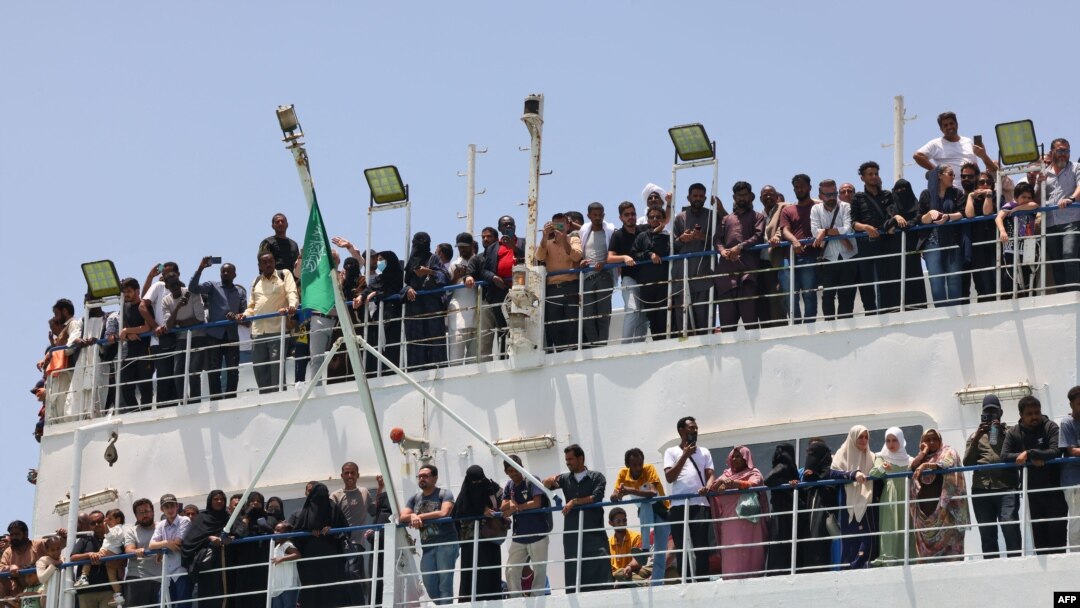Hundreds have been killed and thousands wounded as air strikes and artillery exchanges have gripped swathes of greater Khartoum, sparking the exodus of thousands of Sudanese to neighboring countries.
Many more cannot afford the arduous journey to Sudan's borders, and have been forced to hole up inside the city of five million people with dwindling supplies of food, water and electricity.
"We are hearing some sporadic gunfire, the roaring of a warplane and the anti-aircraft fire at it," said one resident of south Khartoum.
Other witnesses reported air strikes in north and east Khartoum.
The fighting in Sudan has caused more than 330,000 people to flee their homes within the country, with over 100,000 others escaping over the borders, the United Nations said Tuesday.
To help those desperately searching for missing relatives and friends, the International Committee of the Red Cross announced it had set up a special hotline to report disappearances.
Volunteers have also staffed the Mafqoud (Missing) online project, first set up to report disappearances in 2019 which pro-democracy protesters blamed on forces loyal to Burhan and Dagalo following the dispersal of a mass sit-in.
Mafqoud spokesman Mossab Kamel estimates that about 250 people have been reported missing since the fighting began - the majority of them elderly or disabled people and children.
Some of those missing were ultimately found alive - many either being held by the armed forces or the RSF. But in many other cases, the agonizing wait continues.
UNHCR, the U.N.'s refugee agency, is estimating that more than 800,000 people could potentially flee to neighboring countries as the conflict continues in Sudan between the army and a paramilitary group.
The International Organization for Migration said in a situation report that "About 72 percent, roughly 240,000 of these new internal displacements were reported in West and South Darfur alone," spokesman Paul Dillon told reporters.
The number of people displaced in the last two weeks "exceeds all conflict-related displacement in Sudan in 2022", he added.
In a Monday briefing, the top U.N. aid official in Sudan, Abdou Dieng, warned that the situation was turning into "a full-blown catastrophe".
Kenyan President William Ruto said the conflict had reached "catastrophic levels" with the warring generals declining "to heed the calls by the Inter-Governmental Authority on Development (IGAD), the African Union and the international community to cease fire".
In a virtual meeting with senior U.N. officials, Ruto said it was imperative to find ways to provide humanitarian relief "with or without a ceasefire."
On Tuesday, the U.N. said its 2023 aid appeal for Sudan was $1.5 billion short.
Top U.N. humanitarian official Martin Griffiths arrived in Nairobi on Monday on a mission to find ways to bring relief to the millions of civilians trapped inside Sudan.
"The situation unfolding there (in Sudan) since April 15 is catastrophic," he said on Twitter.
Sudan's turmoil has seen hospitals shelled, humanitarian facilities looted and foreign aid groups forced to suspend most of their operations.
The World Health Organization warned that the fighting was pushing Sudan's already ailing health sector toward "disaster" with only 16 percent of health facilities in Khartoum still functioning.
The WHO said that it had delivered six containers of medical equipment to Port Sudan on the Red Sea coast, including supplies for treating trauma injuries and severe acute malnutrition. It had also distributed scarce fuel to hospitals which rely on generators for power.
"The health system has completely collapsed in Geneina," the doctors' union said, adding that looting of clinics and camps for the displaced had forced several agencies to carry out "emergency evacuations" for their teams.
On Friday, Doctors Without Borders said the fighting had forced it to halt "almost all activities in West Darfur."


